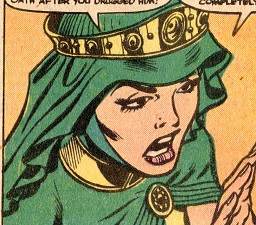
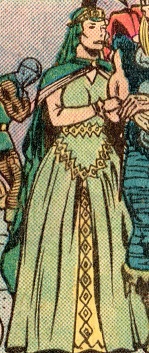
GUTRUNA
Real Name: Gutruna
Identity/Class: Human;
presumably the fifth
century AD (see comments)
Occupation: Ruler of the Gibichung
clan;
former advisor to Lord of the Gibichung clan
Group Membership: Gibichung clan
Affiliations: Siegfried (a mortal incarnation of Thor Odinson);
formerly Hagen
Enemies: Brunnhilda (a mortal incarnation of Brunnhilde the Valkyrie), Hagen, Siegfried (although she loved him, she was complicit in the deception that tampered with his memory and led to his downfall)
Known Relatives: Gunther
(brother), Hagen (maternal half-brother);
unidentified mother and father (they were named
Gibich and Grimhilde in Wagner's saga)
Aliases: Various other
versions of her legend include aliases such as Grimhild, Gudrun,
Gutrune, and Kriemhild (see comments);
by some sources, she is based on Ildico
(see comments);
see
comments for aliases in other stories
Base of Operations: Gibichung clan castle along the river Rhine (see comments)
First Appearance: (Legendary
character (as Kriemhild))
Nibelungenlied (circa 1200 AD);
(Wagner's Gutrune) Götterdämmerung (The
German word for Ragnarok, or The Twilight of the Gods), the final part
in the opera "Der Ring Des Nibelung" (The Ring of the Nibelung) opera (August 17, 1876);
(Marvel's Gutruna) Thor I#299 (September, 1980)
Powers/Abilities: Gutruna had no superhuman abilities, nor did she demonstrate any particular skills. She could command the guards of the Gibichung.
She was willing to allow a noble warrior to be entranced into marrying her.
Height: Unrevealed (approximately
5'6", based on estimation of Siegfried as 6'2")
Weight: Unrevealed (approximately
135 lbs.)
Eyes: Possibly blue (they are
only shown from some distance)
Hair: Unrevealed (she is never
shown without her headpiece, which completely covers her hair);
she has black eyebrows
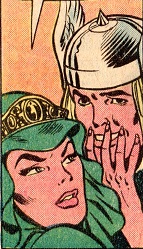
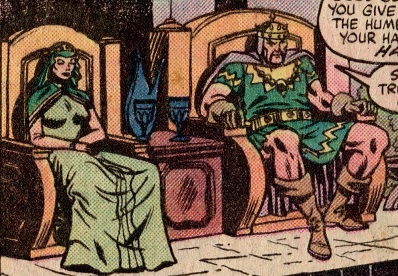
History:
(Thor I#299 (fb) - BTS) - Gutruna was the sister of Gunther, leader of
the Gibichung clan, and the half-sister of Hagen via a shared mother.
(Thor I#299 (fb)) - As Gutruna and Gunther sat in their courtyard, Hagen told them that he had realized that the fame of the Gibichungs could spread no further until they both had found mates worthy of their station.
He then told them of the beautiful Brunnhilda who dwelt upon the Fire Mountain and of the great hero Siegfried who could retrieve Brunnhilda, noting the potion he had that could enslave Siegfried, and that he had arranged for Siegfried's arrival.
(Thor I#299 (fb)) - Hagen subsequently brought Siegfried before Gunther and Gutruna, after which Gunther arranged a toast to Siegfried's exploits, leading Siegfried to drink Hagen's potion-tainted wine. Siegfried swiftly forgot Brunnhilda as soon as he tasted the wine, after which he gazed upon and fell passionately in love with Gutruna:"Milady -- you are the vision of loveliness. I am overcome. Pray tell me your name...Gutruna...how radiant a name...one as favored as you must already be spoken for!"
Gutruna admitted that she was available, but that it would be unseemly for her to marry before her brother did. When Siegfried asked why Gunther had not taken a wife, Gunther told him the woman he would wed was a prisoner on a mountain of fire. Though the scenario seemed vaguely familiar, Siegfried announced that he feared nothing and would happily ascend the mountain for him if he could have Gutruna's hand in marriage.
Gunther agreed, and Hagen advised Siegfried to use the mystic Tarnhelm to alter his appearance to take Gunther's form.
(Thor I#299 (fb) - BTS) - In the form of Gunther, Siegfried captured Brunnhilda.
(Thor I#299 (fb)) - At the next dawn, Siegfried (still in Gunther's form) returned to the Gibichung castle and delivered Brunnhilda to Gunther.
The dual wedding of Gunther to Brunnhilda and of Siegfried to Gutruna was thus planned. Utterly smitten by Gutruna, Siegfried told her, "And now, fair maid, let me partake of your beauty just a moment before you attend to your prenuptial tasks." Similarly smitten, Gutruna told him that his nearness made "my maiden heart flutter."
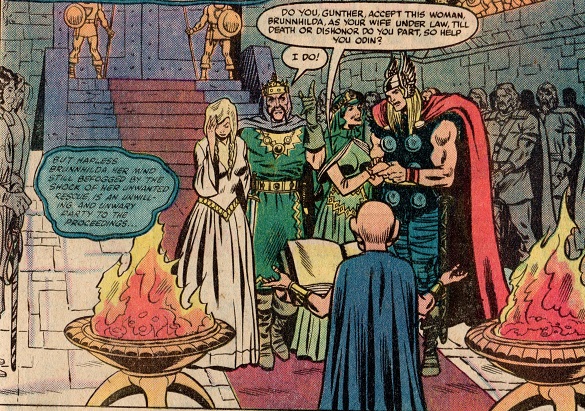
(Thor I#299 (fb)) - The dual wedding commenced with Hagen presiding. However, as Brunnhilda regained her wits, she expressed her confusion as she insisted Siegfried was her lover.
Though Siegfried vowed that he had never thusly touched Brunnhilda, Gunther, counseled by Hagen, incorrectly reasoned that Siegfried had had his way with Brunnhilda while disguised as Gunther the previous night. Striving to salvage some dignity, Gunther ordered his guards to slay Siegfried for defiling his bride.
As Siegfried proceeded to rout all of his opponents, a tearful Brunnhilda -- distraught by Siegfried's apparent betrayal -- unwittingly admitted that Siegfried was charmed, impervious to all harm provided he never turned his back on his foe; Hagen overheard this revelation.
Gutruna urged Gunther to hold back his men, as they clearly could not win and that this slaughter was as much on his hands as Siegfried's. Gunther asked if she still loved this man who had dishonored their house, but she reminded Gunther of his own dishonorable use of a potion to manipulate Siegfried. "If I did not want him so much, I'd ask you to free him from your marriage pact completely!"
Gunther finally called off his men and offered Siegfried a truce if he departed forever with Gutruna.
Siegfried accepted and left immediately.
(Thor I#300 (fb) - BTS) - Gunther decided to make amends with Siegfried for his sister's sake, and he told Hagen he no longer wanted to kill Siegfried.
However, on a hunting trip, Hagen rushed forward and shoved his spear through Siegfried's back while Siegfried was conversing with Gunther; Siegfried died seconds later.
Gunther chastised Hagen and then brought Siegfried back to the castle.
(Thor I#300 (fb)) - There, Gunther told Gutruna that Siegfried had been slain by a wild beast..."A wild beast named Hagen!"
As Gunther drew his sword, Hagen swiftly hurled his dagger into Gunther's chest, killing him.
Gutruna lamented losing a husband and a brother in the same day, and she ordered the guards to seize the little murderer. Hagen tried to retrieve the Ring of Power, but Siegfried's lifeless fist clenched it defiantly, and the guards took Hagen to the prison.
Gutruna was presumably present as Brunnhilda had Siegfried's body consecrated in a funeral pyre, into which Brunnhilda and Grane also leapt.
Comments: Created by
unidentified Norse persons in the Nibelungenlied (more
on that below);
adapted by Richard Wagner in his Ring of the Nibelung
trilogy (more on
that below);
adapted to Marvel from Wagner's version by Roy Thomas, Keith Pollard, and Chic Stone.
For this and all profiles related to the Ring of the Nibelung, you should open up another page in your browser and load Wagner's "Ride of the Valkyrie"
Yes, this is Elmer Fudd's "Kill the Wabbit" song...
These stories were among those told to Thor by the Eye of Odin, and the events therein, particularly the origins of the current Odin incarnation, have been called into question.
Courtesy of Wikipedia:
Götterdämmerung
Götterdämmerung (German for the Twilight of the Gods), is the last in Richard Wagner's cycle of four music dramas titled Der Ring des Nibelungen (The Ring of the Nibelung, or The Ring for short). It received its premiere at the Bayreuth Festspielhaus on 17 August 1876, as part of the first complete performance of the Ring.
The title is a translation into German of the Old Norse phrase Ragnarök, which in Norse mythology refers to a prophesied war among various beings and gods that ultimately results in the burning, immersion in water, and renewal of the world. However, as with the rest of the Ring, Wagner's account diverges significantly from his Old Norse sources.
The Ring of the Nibelung comes, in a very general way, from the old Norse/Germanic legend of the Nibelungenlied ("The Song of the Dwarves").
Gudrun
Gudrun (Old Norse Guðrún) or Kriemhild (Middle High German Kriemhilt) is the wife of Sigurd/Siegfried and a major figure in Germanic heroic legend and literature. She is believed to have her origins in Ildico, last wife of Attila the Hun, and two queens of the Merovingian dynasty, Brunhilda of Austrasia and Fredegund.
In both the Continental (German) and Scandinavian traditions, Gudrun/Kriemhild is the sister of the Burgundian king Gunther/Gunnar and marries the hero Siegfried/Sigurd. Both traditions also feature a major rivalry between Gudrun and Brunhild, Gunther's wife, over their respective ranks. In both traditions, once Sigurd has been murdered, Gudrun is married to Etzel/Atli, the legendary analogue of Attila the Hun. In the Norse tradition, Atli desires the hoard of the Nibelungen, which the Burgundians had taken after murdering Sigurd, and invites them to his court intending to kill them. Gudrun then avenges her brothers by killing Atli and burning down his hall. The Norse tradition then tells of her further life as mother of Svanhild and enemy of Jormunrekr. In the continental tradition, Kriemhild instead desires revenge for her brothers' murder of Siegfried, and invites them to visit Etzel's court intending to kill them. Her revenge destroys both the Huns and the Burgundians, and in the end she herself is killed.
In Richard Wagner's Der Ring des Nibelungen, Siegfried's wife is known as Gutrune. She fulfills the role of Gudrun/Kriemhild in the first half of the legend.
The etymology of Gudrun (Guðrún) is straightforward: it consists of two elements. The first, is Proto-Germanic *gunþ-, Old Norse gunnr, meaning battle. The second element is Old Norse rún, meaning secret. On the continent, this name is only attested for an apparently unrelated figure (see Kudrun).
The etymology of Kriemhild is less clear. The second element is clearly -hild, meaning battle or conflict. There is no consensus about the first element though, and it is also variously spelled Grim- and Crem-. One theory derives it from a root *Grīm- (cf. Old English grīma) meaning mask. Another theory connects it an otherwise unattested root Krēm-. According to both theories, the form Grim- with a short vowel represents an alteration of the original root to be more similar to the word grim, meaning terrible. Yet another theory derives the first element from a verb similar to Middle High German grimmen, meaning to rage.
Scholarly opinion diverges as to which name is more original
Gudrun is believed to have her origins in two historical figures who featured in two originally independent oral traditions, one about the death of Sigurd and another about the destruction of the Burgundians by the Huns.
In the first instance, Gudrun's quarrel with Brunhild, which results in Sigurd's death at the urging of the latter, is widely thought to have its origins in the quarrel between the two historical Frankish queens, Brunhilda of Austrasia and Fredegund, the latter of whom had Brunhild's husband Sigebert I murdered by his brother Chilperic I, her husband. In the oral tradition, Brunhilda's name has become attached to the murderer rather than the wife. The second element of Fredegund's name, meanwhile, corresponds with the first in Gudrun's.
In the case of the destruction of the Burgundians, Gudrun can be traced to Attila's wife Ildico, who was rumored to have murdered him. The written form Ildico is generally taken to represent the Germanic name *Hildiko, which would be a diminutive form of the name Hild and would thus correspond to the second element in Kriemhild.
Nibelungenlied
Kriemhild is the main character of the Nibelungenlied
(c. 1200): she is the first character to be introduced and the romance
ends with her death. The poem is even called "Kriemhild" in at least one
manuscript. It has even been argued that the epic represents a sor tof Bildungsroman
for Kriemhild, as she develops from a relatively mild-manner courtly lady
into a forceful and ferocious avenger of her dead husband. Various
versions of the text judge her actions differently; in the A and B
versions, she is condemned as a vâlendinne (fiend) for her bloody
revenge, but the C version emphasizes her love for her dead husband as her
motivation and absolves her of most blame.
In the Nibelungenlied, Kriemhild is the daughter of king Dancrat and queen Ute of Burgundy, a kingdom centered around Worms. Her brothers are Gunther, Gernot, and Giselher, with Gunther being the king. The poem opens when Kriemhild has a dream that she raised a falcon only to see it killed by two eagles. Her mother explains to her that this means she will love a man very much, but he will be killed. One day, Siegfried comes to the Burgundian court, intending to woo Kriemhild. The two do not speak for a year, but once Siegfried has helped the Burgundians in a war the two are allowed to see each other for the first time. They fall deeply in love and see each other daily. Once Siegfried has helped Gudrun's brother king Gunther acquire Brunhild as his bride, Kriemhild and Siegfried are also married. The couple then leaves from Siegfried's own kingdom at Xanten.
Some years pass, and Kriemhild and Siegfried have a son whom they name Gunther. One day, Brunhild, who had been convinced that Siegfried was Gunther's vassal rather than an equal king, convinces Gunther to invite his sister and Siegfried to stay with them at Worms. Initially, Brunhild and Kriemhild get along, but in the private while they are watching a tournament, they soon argue over which of them has the highest ranking husband. Brunhild accuses Kriemhild of being married to a vassal. The queens part in anger. Later, the two queens encounter each other before entering the cathedral at Worms for mass. Brunhild and Kriemhild each insist that they should be allowed to enter the church before the other. Kriemhild then declares that Siegfried, and not Gunther, has taken Brunhild's virginity, displaying Brunhild apparent proof. Kriemhild then enters the church before Brunhild.
Siegfried is forced to publicly deny the accusation to Gunther, and beats Kriemhild to punish her. Brunhild is not satisfied, however, and Hagen convinces Gunther to have Siegfried murdered. Under the pretext that he wants to protect Siegfried, Hagen convinces Kriemhild to reveal the only spot where impenetrable Siegfried may be wounded. Once Siegfried is murdered while hunting with Hagen and Gunther, his body is thrown in front of Kriemhild's bedroom door. Kriemhild quickly realizes that Siegfried was murdered by Gunther and Hagen. Kriemhild sees to Siegfried's burial and refuses to return to Xanten with Siegfried's father, instead remaining in Worms near her family and Siegfried's tomb. Eventually, Gunther and his brothers are able to reconcile with Kriemhild, but she refuses to forgive Hagen. Kriemhild has the hoard of the Nibelungen, which she has inherited after Siegfried's death,brought to Worms. She uses the hoard to acquire warriors; Hagen, realizing that she is dangerous, conspires to steal the hoard and sink it in the Rhine.
Thirteen years later, king Etzel of the Huns seeks Kriemhild's hand in marriage, and she reluctantly agrees. Thirteen years after her arrival in Etzel's kingdom, she convinces Etzel to invite her brothers to a feast. Gunther agrees and the Burgundians and their vassals arrive at Etzel's court. Kriemhild greets her brothers but mockingly asks Hagen whether he has brought her what he stole at Worms. Later, Kriemhild confronts Hagen with a group of Huns, and Hagen provokes her by bragging that he killed Siegfried.None of the Huns is brave enough to attack, and the Burgundians prevent an attack that Kriemhild had planned for that night. The next day, Kriemhild convinces Etzel's brother Bloedelin to attack the Burgundians' supplies; this occurs while Etzel, Kriemhild, and their son Ortlieb are seated in the hall with Burgundians. Upon hearing of the attack, Hagen decapitates the Hunnish prince. Fighting erupts, but Dietrich von Bern arranges for Kriemhild and Etzel to leave the hall. Kriemhild later demands that Gunther surrender Hagen to her, but he refuses: she then has the hall set on fire. Eventually, Dietrich von Bern captures Gunther and Hagen as the last survivors in the hall, handing them over to Kriemhild. Kriemhild separates the two and demands that Hagen give back to her what he has taken from her. Hagen says he cannot tell her where the hoard is as long as his lord Gunther lives; Kriemhild then has Gunther decapitated. Hagen then reveals that the hoard is in the Rhine; Kriemhild takes Siegfried's sword, which Hagen had stolen, and beheads him with it herself. Dietrich's mentor Hildebrand, outraged that a woman has killed a great warrior, then hacks Kriemhild to pieces.
Although Kriemhild does not appear as a living character in the Nibelungenklage, the sequel to the Nibelungenlied, the poem nevertheless goes to great lengths to absolve her of blame for the catastrophe of the Nibelungenlied. According to the Nibelungenklage, Kriemhild was acting out of true love for Siegfried and the true treachery was that of Hagen. This is underlined by having Hildebrand specifically blame Hagen for the disaster, calling him a vâlant (fiend), the male counterpart to the accusation that Kriemhild is a vâlandinne (fiend).
Thidrekssaga
In the Thidrekssaga, Grimhild (Kriemhild) is the daughter of king Aldrian of Niflungalandand Oda, sister of king Gunnar (Gunther), Gisler (Giselher), and Gernoz (Gernot), and half sister of Högni (Hagen). When Sigurd (Siegfried) comes to Gunnar's kingdom one day, he marries Grimhild and suggests that Gunnar marry Brunhild. Some time later,Grimhild and Brunhild argue over precedent in the king's hall. Brunhild accuses Grimhild of not even being married to a man of noble birth, whereupon Grimhild reveals that Sigurd and not Gunnar took Brunhild's virginity, showing a ring that Sigurd had given her as proof. Brunhild then agitates for Sigurd's murder; once Grimhild's brothers have murdered Sigurd, they place his corpse in her bed.
Some time later, Atli (Etzel) woos Grimhild to be his new wife. Seven years later Grimhild convinces Atli to invite the Burgundians (called Niflungs) to visit her by mentioning the hoard of the Nibelungen which her brothers had stolen from her. Atli is seized by greed for the hoard and agrees. Once the Burgundians arrive, Grimhild demands the hoard from them, but Högni replies that it was left behind. Grimhild attempts to convince Atli's brother Bloedel and Thidrek (Dietrich von Bern) to help her take revenge, but both refuse. Finally, she provokes a fight by bringing her and Atli's son into the hall, seating him across from Högni, and telling the son to hit Högni. Högni reacts to a second blow by cutting off the prince's head, leading to a terrible massacre. After severe fighting, Gunnar is captured, and Grimhild tells Atli to throw him in a tower full of snakes. Högni now leads the Burgundians, who lock themselves in the king's hall. Grimhild orders the hall set on fire, and in the following battle Gisler and Gernoz die. Grimhild sticks a piece of flaming wood into her dead brothers' mouths to see if they are dead, causing an enraged Thidrek to kill her.
The author of the saga has made a number of changes to create a more or less coherent story out of the many oral and possibly written sources that he used to create the saga. The author mentions alternative Scandinavian versions of many of these same tales, and appears to have changed some details to match the stories known by his Scandinavian audience. The saga's version of the downfall of the Burgundians represents a unique mix of elements known from the Norse and continental traditions.
Rosengarten
zu Worms
In the Rosengarten zu Worms (c. 1250), Kriemhild is the daughter of king Gibeche. She possesses a rose garden that is guarded by twelve heroes, including her fiancé, Siegfried. Desiring to see whether Siegfried can beat Dietrich von Bernin in combat, she challenges Dietrich to bring twelve of his own heroes for a day of tournaments in the rose garden. The winner will receive a garland and a kiss from her as a reward. Dietrich accepts the challenge, and the heroes come to Worms. Eventually, all of the Burgundian heroes are defeated, including Siegfried, who flees to Kriemhild's lap in fear when Dietrich starts breathing fire. Dietrich's warrior Ilsan, a monk, punishes Kriemhild for her haughtiness in challenging Dietrich by demanding so many kisses from Kriemhild that his rough beard causes her face to bleed. In one version of the poem, Hagen curses Kriemhild for having provoked the combat.
The poem takes a highly critical judgment of Kriemhild. As in the A and B versions of the Nibelungenlied, she is called a vâlandinne (fiend) and she derives great joy from watching the knights fight in at times brutal combat.
The name of Kriemhild's father, Gibeche, corresponds to Gjúki in the Scandinavian tradition, and is also found in the Lied vom Hürnen Seyfrid and Heldenbuch-Prosa (see below); this shows the Rosengarten's connection to an oral tradition outside of the Nibelungenlied, despite the Rosengarten's obvious knowledge of the earlier poem.
The Heldenbuch-Prosa, first found in the 1480 Heldenbuch of Diebolt von Hanowe and afterwards contained in printings until 1590, is considered one of the most important attestations of a continued oral tradition outside of the Nibelungenlied, with many details agreeing with the Thidrekssaga.
In the Heldenbuch-Prosa, Kriemhild is the daughter of king Gibeche and married to Siegfried. She arranges for the disaster at Etzel's hall in order to take vengeance on Dietrich von Bern for having killed Siegfried in the rose garden. She provokes the fighting by having her and Etzel's son brought into the hall and having the child provoke Hagen, who kills it. This leads to an outbreak of hostilities in which many heroes die. When Dietrich takes Gunther and Hagen prisoner, she cuts off their heads, causing Dietrich to cut her to pieces.
In the late medieval/early modern heroic ballad Das Lied vom Hürnen Seyfrid, Kriemhild is the daughter of king Gybich and brother of Gunther, Gyrnot (Gernot), and Hagen. The name Gybich agrees with the Rosengarten zu Worms and corresponds to the Old Norse Gjúki, and the fact that Hagen is one of Kriemhild's brothers accords with the Thidrekssaga and the Scandinavian tradition as well. This is taken as evidence that these elements of the tradition existed in oral story-telling into the late Middle Ages.
In the middle of the ballad, a dragon abducts Kriemhild from her home in Worms. The dragon holds Kriemhild captive for years in his lair of mount Trachenstein (dragon stone), treating her well. One day it lays its head in her lap and transforms into a man, explaining that she needs to stay with him for five years. After that time he will marry her and they will travel to hell together. Kriemhild prays to avoid this fate. Finally, Siegfried (Seyfrid) arrives to save her, but the dragon appears. The dragon forces Siegfried and Kriemhild to flee into the depths of the mountain, where they find the treasure of the Nibelungen and a sword that can cut through the dragon's skin. Siegfried defeats the dragon, and Kriemhild and Siegfried return to Worms, where they are married and Siegfried rules together with Kriemhild's brothers. Her brothers, however, resent how powerful Siegfried has become and after seven years, they murder him.
It has been suggested that Siegfried's liberation of Kriemhild may be a repurposing of a lost German story about Brunhild, though this is far from certain. The Nibelungenlied version includes a version of Siegfried's freeing of Kriemhild from a dragon, meaning the legend developed by 1400. The earliest surviving copy of the ballad itself is from 1530.
Prose Edda
The so-called Prose Edda of Snorri Sturluson is the earliest attestation of the full Scandinavian version of Gudrun's life, dating to around 1220. Snorri tells the story of Gudrun in several chapters of the section of the poem called Skáldskaparsmál.
His presentation of the story is very similar to that found in the Völsunga saga (see below), but is considerably shorter.
Gudrun is introduced as the daughter of Gjúki and Grimhild, full sister to Gunnar and Högni, and half-sister to Guthorm. Gudrun marries Sigurd when he comes to Gjúki's kingdom. When Sigurd returns from aiding Gunnar in his wooing of Brunhild, Sigurd and Gudrun have two children, a son named Sigmund and a daughter named Svanhild. Some time later, Gudrun and Brunhild have a quarrel while washing their hair in a river: Brunhild says that she cannot have the water that touched Gudrun's hair touch hers, for she is married to the braver husband. The fight leads Gudrun to reveal that it was Sigurd in Gunnar's shape who rode through the flames to woo Brunhild, producing a ring that Sigurd had taken from Brunhild as proof. This knowledge leads Brunhild to agitate for Sigurd's murder, which is performed by Gudrun's half-brother Guthorm, who also kills the young Sigmund.
Following this, Gudrun is married to king Atli (Attila). When Atli invites Gudrun's brothers and kills them for their gold,Gudrun kills her two sons by Atli. She makes their skulls into drinking goblets and cooks their hearts, giving them to Atli to eat. She then tells Atli what she has done, and later kills Atli together with Högni's son. She then burns down the hall.
Afterwards, Gudrun tries to drown herself in the sea, but she washes ashore in the land of king Jonak. Jonak marries her and has three sons with her, Sorli, Hamdir, and Erp. Svanhild, Sigurd's daughter, is also raised there, before being married to king Jormunrek. When Jormunrek kills Svanhild for adultery, Gudrun tells her sons to kill him, giving them special weapons that could not be pierced by iron. The sons die in the attempt, leading to the extinction of Gjúki's line
The Völsunga saga follows the plot given in the Poetic Edda fairly closely, although there is no indication that the author knew the other text. The author appears to have been working in Norway and to have known the Thidrekssaga, and therefore the Völsunga Saga is dated to sometime in the second half of the thirteenth century.
In the saga, Gudrun is the daughter of Gjúki, sister to Gunnar and Högni,and Guthorm. Gudrun is introduced to the saga having a bad dream; she chooses to go to Brunhild to have this dream interpreted. Brunhild explains that Gudrun will marry Sigurd, even though he is betrothed to Brunhild, and that Gudrun will afterwards lose him due to conflict.When Sigurd comes to the court, Gudrun's mother Grimhild gives Sigurd a potion to forget his betrothal to Brunhild, and he marries Gudrun. Sigurd then helps Gunnar woo Gudrun, using a spell taught them by Grimhild, and for a time Brunhild and Gudrun share Gjúki's court.
One day Gudrun and Brunhild quarrel while washing their hair; Brunhild insists that her husband Gunnar is a higher-ranking man than Sigurd. This causes Gudrun to reveal that it was Sigurd in Gunnar's shape who won Brunhild, and she shows Brunhild a ring that Brunhild had given Sigurd as proof. The queens continue their quarrel in the king's hall the next day. Brunhild then persuades Gunnar and Högni to have Sigurd killed, claiming that Sigurd slept with her. The murder is carried out by their younger brother Guthorm. Guthorm attacks Sigurd while he is asleep in bed with Gudrun; Sigurd is mortally wounded, but kills Guthorm. He then assures Gudrun that he never deceived Gunnar and dies. Gudrun then cries out loudly, which Brunhild answers with a loud laugh.
Gudrun afterwards flees to the Danish king Half, but is later retrieved by her family. Grimhild gives her daughter a potion to make her forget her anger against her brothers, then convinces a reluctant Gudrun to marry Atli. Atli and Gudrun are not happily married, and Atli soon desires the gold of Gudrun's brothers. He invites them to his hall intending to kill them for the gold. Gudrun warns them, but the warning is ignored. When the brothers arrive, Gudrun first attempts to mediate between the two sides, but afterwards fights with her brothers until they are captured and then killed. During the preparations for the funeral feast for her brothers, Gudrun kills Atli's sons. She feeds their flesh to Atli. Then she kills Atli in his bed with the help of Högni's son Niflung. Finally, they set the palace on fire and kill everyone inside.
Gudrun now attempts to drown herself, but she is instead washed up in the land of king Jonak, who marries her. They have three sons, Hamdir, Sorli, and Erp. Gudrun's daughter with Sigurd, Svanhild, is also raised at Jonak's court. Svanhild marries King Jormunrek, but kills her on suspicion of adultery. Gudrun then rallies her sons to avenge their half-sister, giving them armor that cannot be cut through by iron.
Wagner's Gotterdammerung
New images by Ron Fredricks.
Profile by Snood.
CLARIFICATIONS:
Gutruna should be distinguished from:
images: (without ads)
Thor I#299, p17, pan3 (main image - Gutruna)
Thor I#299, p16, pan6 (headshot - Gutruna)
Thor I#299, p6, pan1 (Gutruna with Siegfried)
Thor I#299, p3, pan1 (Gutruna [left] on throne, beside Gunther)
Thor I#299, p12, pan1 (wedding)
Appearances:
Thor I#299 (September, 1980) - Mark
Gruenwald (writer), Keith Pollard
(penciler), Chic Stone (inker), Jim Salicrup (editor)
Thor I#300 (October, 1980) - Mark Gruenwald
& Ralph Macchio (writers), Keith
Pollard (penciler), Chic Stone (inker), Jim Salicrup (editor)
First posted: 04/02/2019
Last updated: 10/01/2025
Any Additions/Corrections? please let me know.
Non-Marvel
Copyright info
All other characters mentioned or pictured are ™ and © 1941-2099
Marvel Characters, Inc. All Rights Reserved. If you like this stuff, you
should check out the real thing!
Please visit The Marvel Official Site at: http://www.marvel.com
Special Thanks to www.g-mart.com for hosting the Appendix, Master List, etc.!